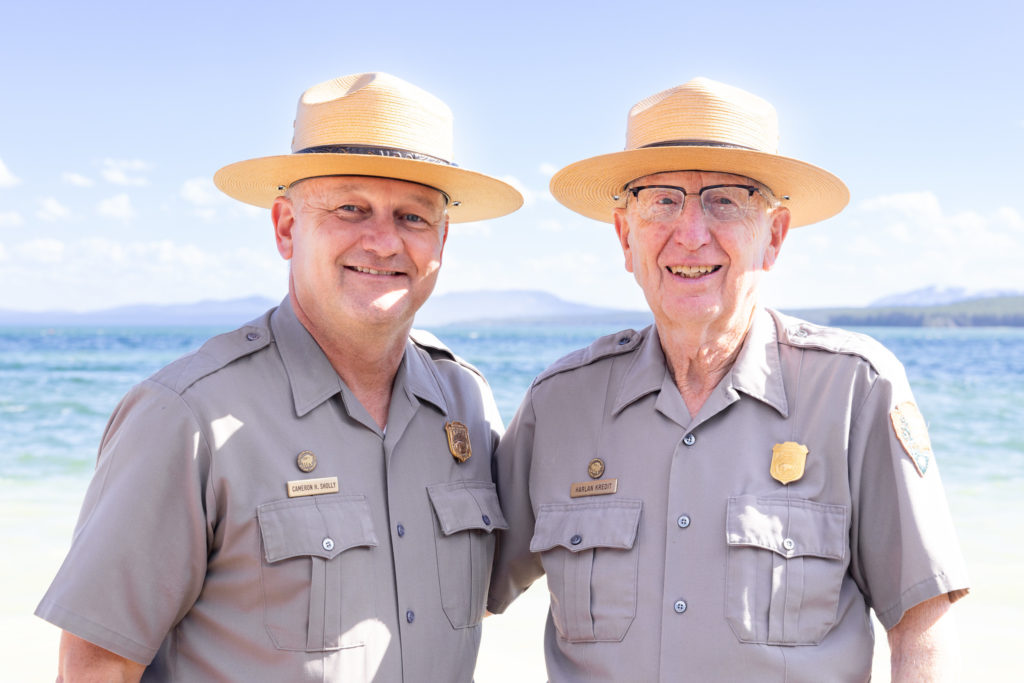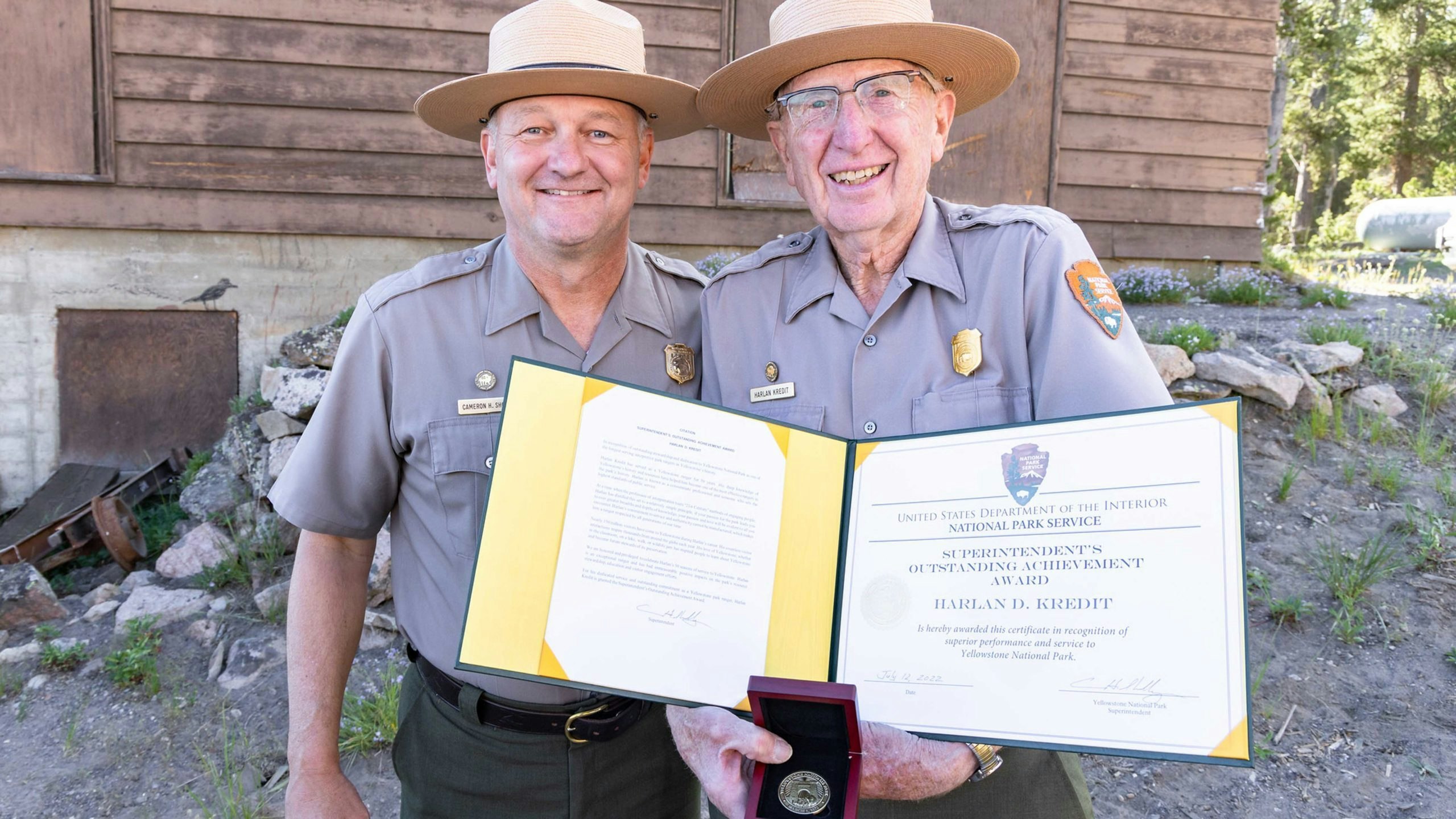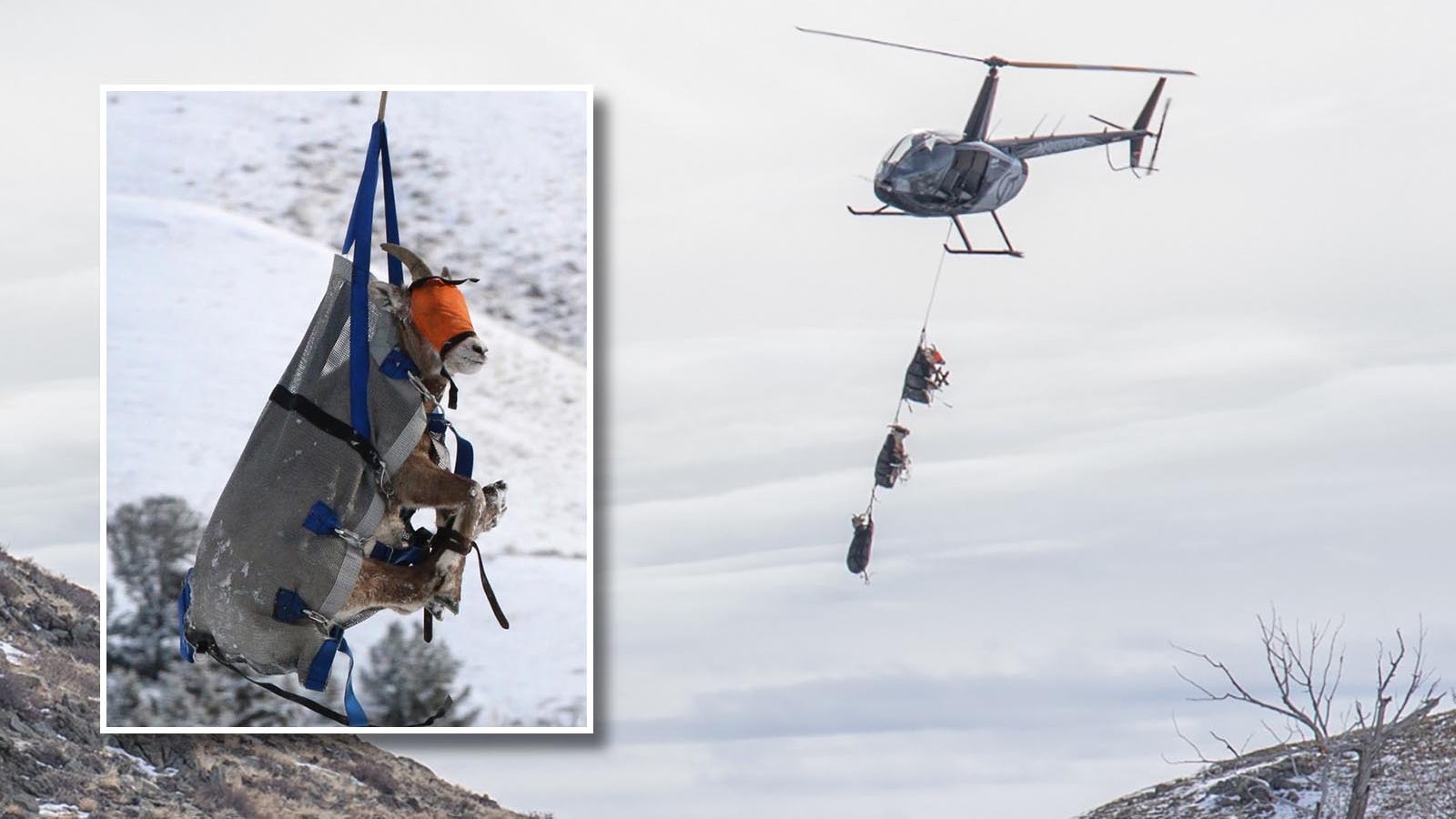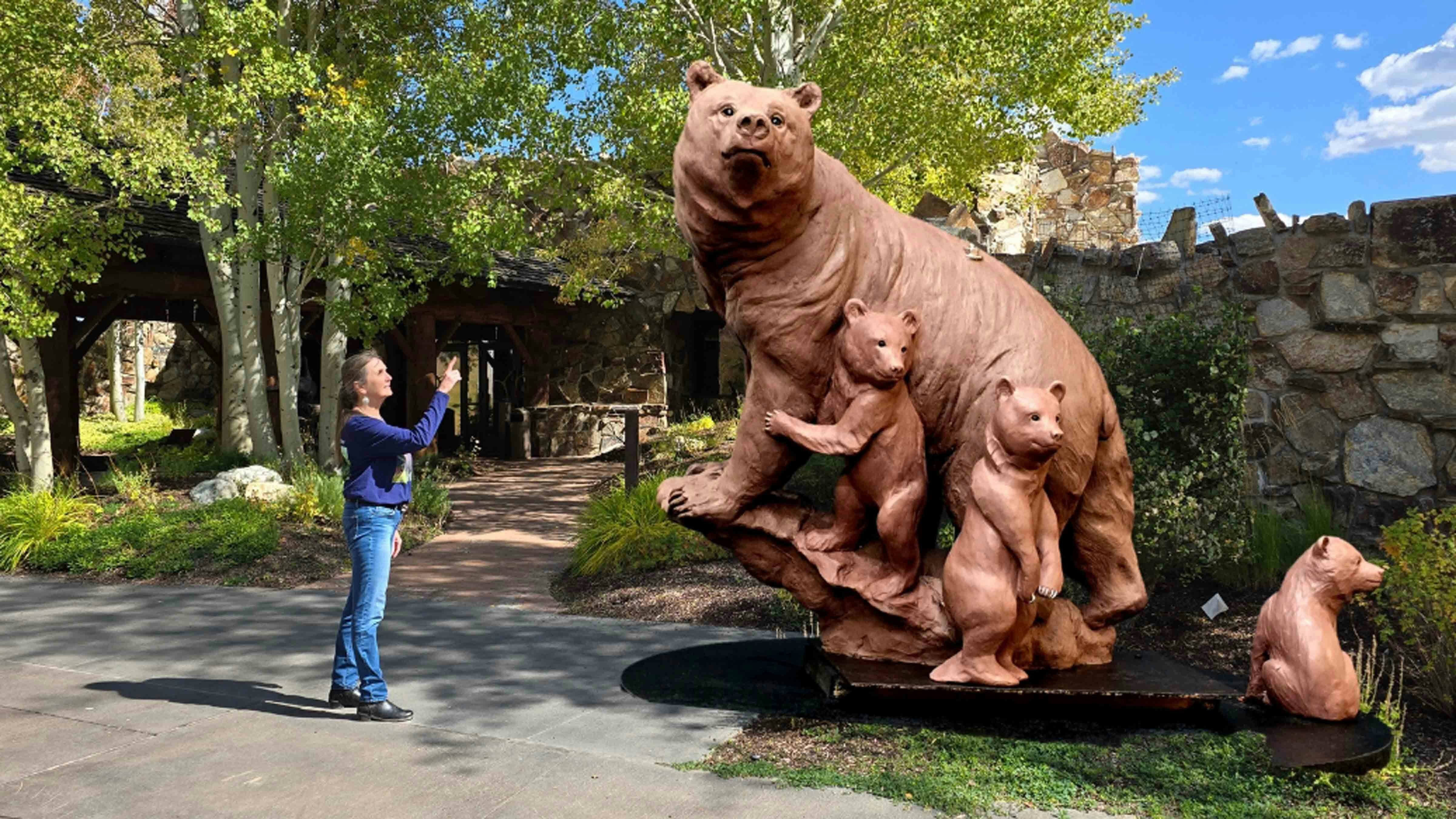By Wendy Corr, Cowboy State Daily
Yellowstone National Park Ranger Harlan Kredit just got back from leading a group of 27 people up to Avalanche Peak, a 4.7 mile round trip hike that climbs an impressive 2,100 feet to the top.
Leading hikes up Avalanche Peak is just one of Kredit’s duties as a Park Ranger, something he’s done every summer for the past 50 years.
Yes, 50 years. Kredit is 82 years old, and likely the longest-serving Park Ranger in Yellowstone’s 150 year history.
“Cam Sholly, the superintendent, he said, ‘I think you are the longest serving ranger in Yellowstone,’” Kredit told Cowboy State Daily.
Kredit was recently honored for his longevity with a party at Yellowstone Lake. Close to 250 people attended.
“About 70 of those were relatives of mine,” Kredit said.
All In the Family
Kredit has been working as a park ranger in Yellowstone every summer – with the exception of two, when he moved to his home in Washington state – since 1971.
“For the first couple of years I just worked like everybody else did,” he said. “I gave two evening talks, and worked in the visitor center, and so on.”
After a couple of years, Kredit said he was appointed the supervisor of the Fishing Bridge area, which he did for about 10 years.
“They wanted that to be a permanent position, and I wasn’t interested in a permanent position, because I still wanted to do my teaching for the rest of the year,” he said. “So I’m just one of the regular interpreters. And in that sense, my job hasn’t changed in 50 years, in terms of what I’m asked to do.”
When he first started, Kredit said his wife and children spent summers with him in a little cabin next to the visitor center. Their three children themselves worked in the Park for a few years when they grew old enough, and are following in their dad’s footsteps.
“My daughter is still working for the park service in the summers,” Kredit said, “and her husband’s a law enforcement ranger at Canyon during the summer.”
His daughter’s three children are now growing up in Yellowstone, just as she was raised.
“So now I have three grandchildren here,” Kredit said. “And so it’s kind of the neat part for me. On my days off I go hiking with my grandkids, or take ing them fishing to Yellowstone Lake. So we’re into the third generation here now.”
Kredit’s 15-year-old grandson is just starting to volunteer for the park service, working with his mother at one of the ranger stations.
“So it’s kind of fun to see my grandson in a volunteer uniform like that,” he said. “And who knows, maybe he’ll work for the park someday. I don’t know about that.”


You Can’t Take the Teacher Out Of the Ranger
In earlier years, when the summers were over, Kredit would go back to his “regular” job as a science teacher in Washington state. But there have been times when his two worlds collided, as they did on a summer night years ago, when he got called out with the volunteer fire crew, which he served on for 35 years.
“I’d say it was about two o’clock in the morning, and it was a false alarm sort of thing,” Kredit said. “I’m driving the fire truck, I’m going past the Lake area, and I said, ‘Look, guys, we’ve got to do this.’ I got on the intercom, I pulled the fire truck off the road – nobody else was around – and I said, ‘Everyone get out of the truck.’”
Kredit led his fellow firefighters to the middle of a meadow and had them all sit down, then proceeded to spend the next 15 minutes presenting a program about the night sky, which he usually reserved for visitors.
“Last week, Tuesday, two of the guys who were on the fire department then, they said they never forgot that 2:30 In the morning, standing out there in their fire gear in the middle of this meadow, and I’m doing a night sky program, because I teach astronomy,” Kredit said.
Staying On Top Of the Science
Kredit has learned quite a bit about the science of Yellowstone National Park in his 50 years here.
“I’ve always tried to stay up with the latest science that’s going on,” he said. “A lot of my good friends are working for the U.S. Geological Survey, and also, the people that are diving in Yellowstone Lake who have ROV (Remote Operated Vehicle) units and are studying those events? I’ve had a lot to do with them.”
Kredit considers himself a lifelong learner.
“We have so much more to figure out,” he said. “The whole microbiology world, what’s underneath Yellowstone Lake, the archaeology stuff, and Native American usage around the park. I was a science guy, and I liked the science part.”
Big Changes In 50 Years
Visitation has certainly changed since Kredit first worked in Yellowstone.
“If you look at the visitation records in 1971 compared to, like last year, it’s at least doubled the visitation,” Kredit observed, but he said fewer families are visiting the park. Also, he said he sees more animals than he used to.
“I see a lot more bison and bears, and wolves, obviously, introduced in ‘95 and ‘96,” he said. “But a lot more of those animals are visible.”
Technology has also made coming to Yellowstone a more modern experience, with phone apps changing how visitors interact with nature. But some things, Kredit said, remain the same.
“When you get people out on a trail,” he said, “and you talk to them about how important these parks are, and try to get them to use all their senses, that has not changed. I love the curiosity of the kids, and they’re still as curious as they always were.”
Doing the Job Right
Kredit has been involved in some dramatic situations during his years as a Yellowstone park ranger.
“I was involved in a search for a little 15-month old toddler in the area down at Lewis Lake,” he said, recalling an incident that happened in the 1980s, when a small child had crawled out of his tent while his parents and grandparents were sitting at a nearby campfire.
“I was fortunate enough to find him at three o’clock in the morning,” Kredit said, “huddled under a couple of trees, kind of cold.”
Kredit counts his search for the child as a life-changing experience, one of many he’s had in his career.
“In a case like that, it would have been really easy for me to just walk past those trees, because I’d kicked my way through hundreds and hundreds of them for the past five hours,” Kredit said. “But that small voice said, ‘Go back and do it right.’ So I just turned around and came back and kicked my way into those three trees. And there’s that baby laying there looking up at me.”
Kredit said the experience really changed the way he looked at things, and reminded him to take care to do a job right, and to the best of his ability.
“I never forgot that,” Kredit said. “Every time I drive past that Lewis Lake Campground, I think of that experience.”
A Word of Advice
Kredit said in his 50 years, he’s witnessed quite a few wrong steps by visitors.
“It amazes me that so many visitors do not understand that it’s not a good idea to walk up and try to pet a bison,” Kredit said, acknowledging that people aren’t used to the idea that these animals are wild animals, which means they should not be approached.
“In Yellowstone, it just seems like a lot of people are so excited,” he said. “They’ve never seen this before, that they do things on the roads that put themselves and the animals in jeopardy.”
Kredit recalled a particular instance in which a bystander reported a dangerous situation.
“I was working at the Visitor Center and a very angry lady came in there with her camera and says, ‘Ranger, you’ve got to do something about this,’” he recalled. “And she put her camera down in front of me and showed me a few pictures. And there were about three pictures that showed a family of about six people taking their child out, I guess about four or five years old, and sitting that child on the back of a bison.”
Kredit said he still uses those photographs in his educational programs as an example for other visitors.
“This is such a big, dynamic place,” he said, “with maybe 35 or 40,000 new people coming in a day, and all of them bring their own special concerns and joys and questions, and it’s always a challenge to try to help them as much as you can and some days we do a better job than others. But that’s what we do every day, we’ve got to give it our best shot, and life goes on.”
The Importance of National Parks
“All over the country, people (still) gravitate towards national parks,” Kredit said. “And we need that for a whole lot of different reasons. It makes for a healthier generation of people, and we need these badly. So I’m a real strong advocate of public lands no matter where they are, because our nation is going to be stronger for it.”
“Yesterday I was out at Mud Volcano and I talked to a couple of hundred people out there,” Kredit said. “And they all were just as curious as they were 50 years ago.”
Kredit said it’s an honor and a challenge to explain what’s happening, and why these parks are so important for people – and how they have to be protected for the next generations.
“I’m old,” he said, “and my grandkids now, they’re going to be the new leaders of the park system.”
Going Strong At 82
Kredit said that his recent hike up Avalanche Peak was one of dozens over his career in Yellowstone, and is his favorite place to go in the Park.
“I’ve probably done it 150 times,” he said. “You stand on the top of that mountain, and you look around, and it is just a marvelous, liberating feeling… it’s just kind of the best of the best. It’s an aggressive hike, a pretty strenuous hike, but once you’re up there it’s really worth it.”
Kredit acknowledged that the Avalanche Peak hike isn’t as easy to do at age 82 as it was for him at age 22.
“But you know, you just kind of believe you can do it, and go at a steady rate, and it’s fun,” he said. “And I intend to do it a couple more times this summer.”
Will he be back next year, at age 83?
“I would like, I think, to come back next summer,” Kredit said. “You know, I have to decide what I want to do when I grow up.”





